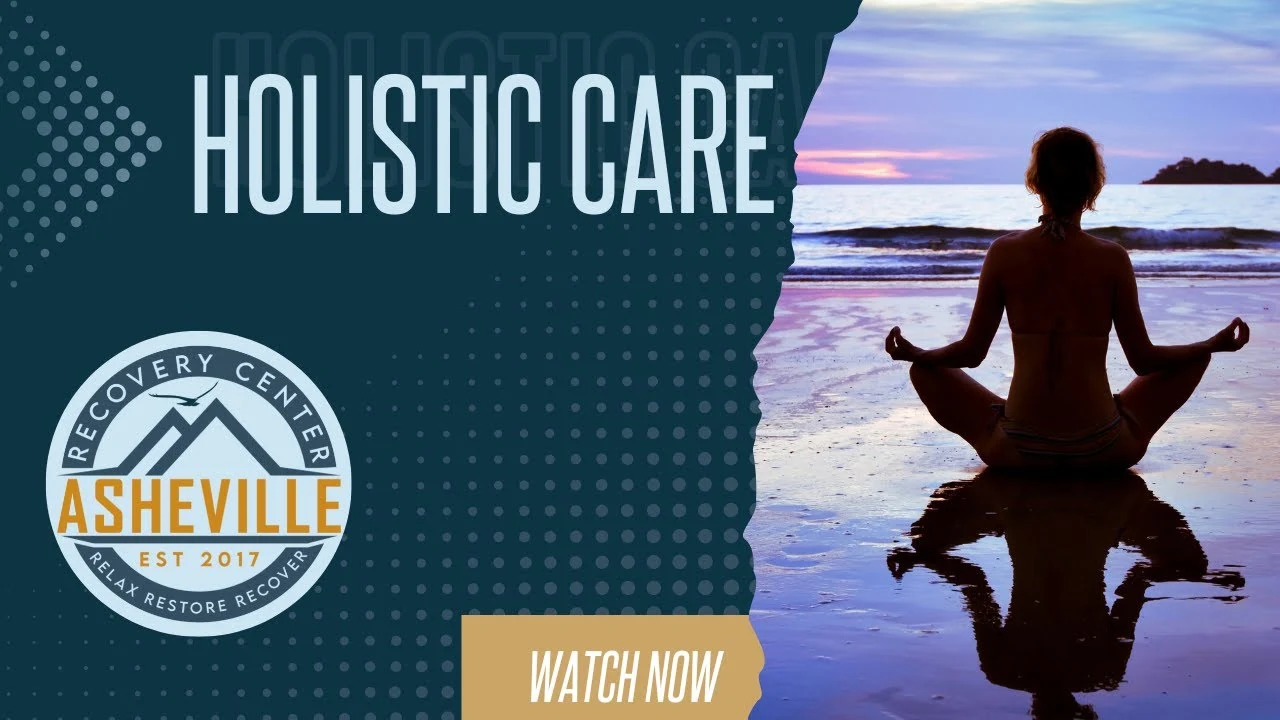Holistic Therapy in Asheville, NC
Addiction is a complex disease. Knowing this, we at Asheville Recovery Center offer holistic therapy to treat the whole individual, not just the addiction.
Holistic Therapy in Asheville, NC
Addiction is a complex disease. Knowing this, we at Asheville Recovery Center offer holistic therapy to treat the whole individual, not just the addiction.



holistic therapy services
Our Holistic Therapy Services
Quality addiction treatment must address all components of addiction: physical, emotional, and mental. Holistic therapy aims to do just that. By combining evidence-based therapies with holistic treatments such as nature therapy, guided meditation, and nutrition education, clients are able to heal fully, not just at the surface level.
Traditional forms of therapy, like individualized and group therapy, are shown to be effective throughout treatment. But, research and experience have shown the staff at Asheville Recovery Center that alternative methods of therapy also help patients in addiction recovery to heal from their pasts and make way for a better future. There are a few forms of holistic therapy that are offered at Asheville Recovery Center for patients who wish to have a more fulfilling treatment experience and give themselves the best chance for a long-term and successful recovery.
What is Holistic Therapy?
Surgery, medication, and individual therapy are all examples of traditional medicine used by many Americans. Traditional medicine is based on the physical symptoms patients experience. The goal of traditional medicine is to find the problem resulting in the symptom and treat it. Most traditional treatments and therapies target one organ or system of the body. However, holistic medicine differs from traditional medicine because instead of specifying and treating one particular area of the body, it targets the entire body as a whole.
The idea of holistic therapy is that physical symptoms are a result of a body that is not in balance, and the therapies work to regain that balance and restore healing. Additionally, holistic therapy does not only focus on only the physical, as traditional medicine does. Rather, holistic therapy aims to treat an individual regarding their physical, emotional, mental, and spiritual forms. Holistic medicine dates back thousands of years and comes from the East, but methods of holistic therapies are beginning to show much promise in the lives of individuals recovering from addiction in the Western world.
Download Our Free E-book!

Benefits of Holistic Therapy in Treating Addiction
In most situations, a one-sided approach to solving problems does not address all the possible sources of conflict. Avoiding situations that make you want to drink may prevent you from relapsing at that moment, but this approach may isolate you and cause emotional friction, resulting in cravings. While individual therapy allows you to be heard and seen, it does not make you feel socially connected. Holistic treatment, on the other hand, integrates all aspects of your being and provides a number of benefits including:
Stress Relief
Using drugs or alcohol is often a method of self-medication for people with high levels of stress. In order to maintain sobriety, you’ll need to find alternative ways to cope with stress once you enter recovery. A significant advantage of holistic therapies is that they enhance stress reduction. You will new ways to enjoy life without the assistance of substances after rehab. Many types of holistic therapy are also available after rehab, allowing you to continue engaging in them as a method to handle stress outside of treatment.
Relapse Prevention
Preventing relapse is critical to recovering from addiction. Treatment that is holistic may help to lower the chance of relapse. Another important but often neglected aspect of relapse prevention is the ability of these therapies to help you find your purpose and fulfillment in life. When people feel as if they have a purpose to remain sober, they are more likely to stay clean. These therapies may assist people in discovering their purpose so that they can lead fulfilling and drug-free lives. A purpose may be found through a wide variety of things, including a job, volunteering, creative activities, or child-rearing.
Improved Overall Health
Being addicted to a substance can lead to health problems, and certain holistic therapies can address some of them naturally. Some therapies, including nutritional therapy and yoga, have obvious health consequences. Others have subtle effects. For example, meditation may improve sleep, lower blood pressure, and reduce pain. Holistic therapies can also improve mental health. Addiction and mental illness are often associated, and in fact, almost half of people with addiction have a co-occurring mental illness. With the help of holistic therapies, you can relieve symptoms of mental illness and prevent relapse.
Restored Self-Esteem
An addiction can negatively impact your self-esteem and identity. You may feel shame and self-doubt. You may believe that you lost yourself as you became involved with drugs, leaving you with doubt about your identity. Through holistic therapies, you can reconnect with yourself. You can gain self-confidence by learning new skills as you work through difficult feelings. You can look inward in a secure environment and reclaim your identity which is important to maintaining sobriety.
Types of Holistic Therapy Offered at Asheville Recovery Center
Yoga Therapy
One of the holistic therapies offered at Asheville Recovery Center is yoga. Yoga utilizes stretching, breathing, exercise, and meditation all in one sitting to regain balance throughout recovery. Benefits of yoga throughout addiction treatment include stress reduction, sleep regulation, internal reflection, increased energy and stamina, reduced symptoms of pain, and an overall improvement of quality of life. Spending time practicing yoga can also help individuals looking for healthy outlets for relapse triggers in early recovery. Yoga helps to give the mind, body, and soul the balance it needs to gain more from other methods of therapy utilized during treatments.
Meditation Therapy
Meditation uses breathing and inner reflection to help the mind and body heal. Throughout recovery, individuals will experience triggers and cravings for their drug of choice. Meditation is a useful technique to manage these cravings and redesign thought processes that lead to relapse triggers. Individuals who struggle with addiction and wish to live a life of sobriety need to learn how to live in the present moment. Doing so allows these individuals to focus on their sobriety presently, instead of worrying about the future or gaining anxiety from the past. Meditation helps to bring the self back to earth and calm the mind so that treatment can be more effective and healing can take place. Further benefits of meditation include self-acceptance, decreased anxiety, and heightened concentration.
Therapeutic Exercise
In addition to increasing physical health, mental and emotional well-being are also enhanced while undergoing this therapeutic exercise, also known as exercise therapy. Swimming, jogging, hiking, dancing, yoga, and other sports are all examples of activities that may be involved. Group exercise therapy helps build interpersonal skills and facilitates group cooperation. Group physical activities also help individuals develop a sense of trust and teamwork. Exercise, itself, encourages persistence and perseverance through a sense of routine, which is triggered by physical releases of endorphins, which reduce stress.
Therapeutic Nutrition
A person struggling with substance abuse might benefit from a shift in diet. A nutritionist can help patients discover how certain foods can assist with recovery, while others may hinder it. With this professional guidance, individuals can learn more about the connections between food, mental health, and physical health. With nutritional therapy, meals will be prepared that can help your body recover from substance use-induced damage, such as malnutrition and neglect. After treatment is over, clients can make educated and helpful dietary choices relying on their understanding of food’s impact on their mental and emotional health.
Ecotherapy
During substance abuse treatment, eco therapy is used to promote sobriety, personal growth, and self-esteem by providing structured physical activities. Whether kayaking, rock climbing, or fishing, eco therapies are usually group activities. Using group eco therapies can help clients participate in experiential activities that reduce depression and anxiety while improving self-confidence and emotional balance. The most crucial outcome of eco therapy is that it produces all of these positive feelings without drugs and alcohol.
Holistic Therapy at Asheville Recovery Center
At Asheville Recovery Center, treatment specialists have developed a unique, hybrid model of treatment which combines a traditional 12-step program with holistic rehabilitation. A multitude of services, programs, and therapies are offered, including the Partial Hospitalization Program, Residential-style treatment, outpatient rehabilitation, and more.
The founders of Asheville Recovery Center, as well as many of our addiction therapists, have struggled with addiction and now enjoy life in recovery. They understand the struggles of addiction and how difficult it is to overcome alone. If you feel that you or a loved one is struggling with substance abuse, our specialists are on standby and ready to help

